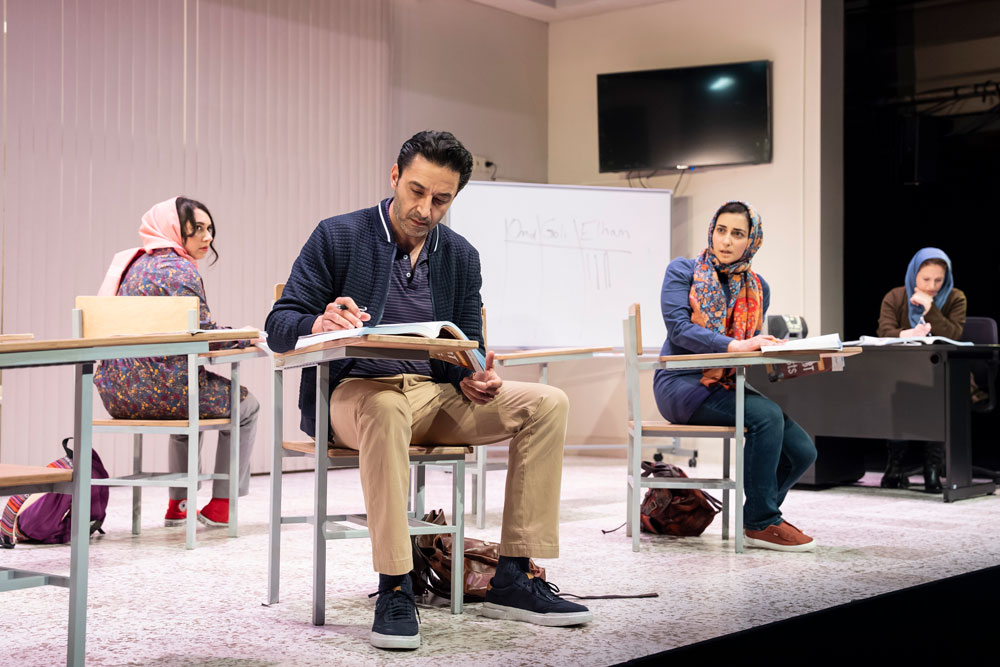
Frustration and anger can fuel beautiful art that sheds essential insight on the world and the people who inhabit it. Sanaz Toossi’s, English, now on the Goodman’s Owen stage, does that and much more as it takes us inside an Iranian classroom where three adults and an eighteen-year-old are struggling to learn English as their second language.
The why is as important as the what and critical to achieving the playwright’s objectives with this effort. Born in the United States to parents who immigrated to America from Iran, Toossi grew up speaking Farsi at home and didn’t get serious about English until kindergarten. Like the children of millions of immigrants, she’s a product of two worlds who developed a deep appreciation for both. Stunned by the Muslim travel ban instituted while she was in graduate school, and incredulous at the level of hatred and vitriol directed at immigrants during that period, processing these distressing developments ignited an inner rage. Her life was a daily reminder of the hard work and sacrifice immigrants make to build a better future for themselves and their families. English, a graduate school thesis that went on to win the Pulitzer Prize, is her response.
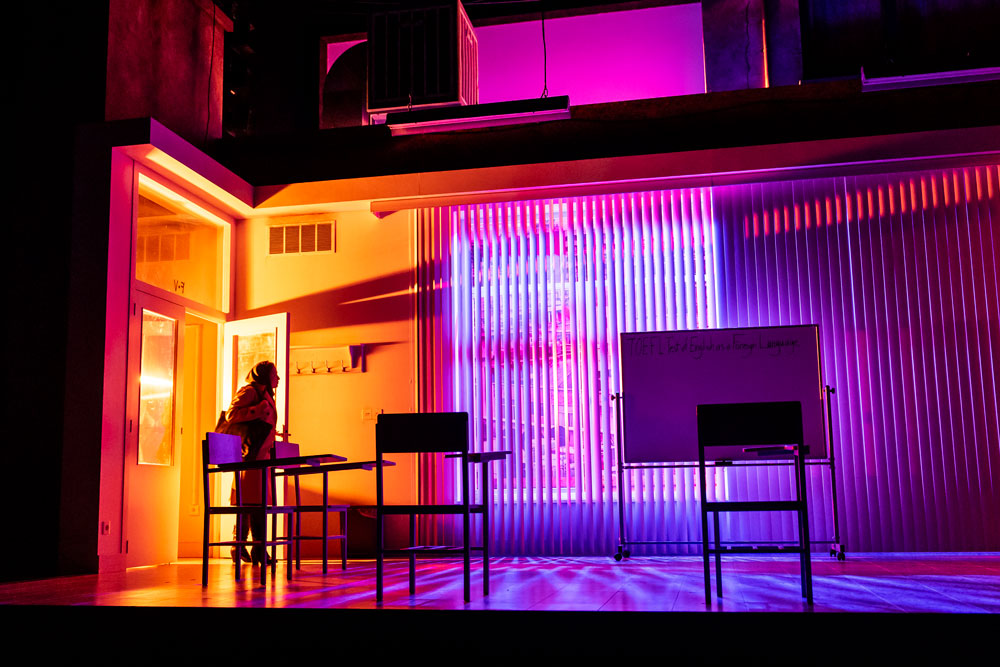
Neither the frustration or rage that motivated the writing of English dominate over overshadow this unassuming masterpiece. A very human play that gives us a firm understanding of what drives people to take on Herculean challenges in order to achieve a dream, it seduces with its clarity, calm and honesty.
English’s director, Hamid Dehghani, knows firsthand what it takes to pass the notoriously rigorous Test of English as a Foreign Language (TOEFL) exam. Constrained artistically in Iran, he made the decision to pursue the American Dream by learning English, migrating to the States and obtaining a graduate degree. Although successful in accomplishing all three, the effort proved painfully arduous and humbling; endowing him with an abiding empathy for the four people we meet in the play going through the same ordeal.
As descendants of the great Persian empire, Iranians can claim one of the richest cultures on earth and their native tongue stands as one of their most esteemed legacies. For many, the choice to become an English speaker is made to meet an end. And it’s precisely that kind of raw pragmatism that drives, Roya (Sahar Bibiyan). Her son has already migrated to Canada and started a family. Everyone’s agreed that she’s to eventually move to Canada as well and join them. But there’s a condition. To insure the smooth acculturation of her infant granddaughter, she must first learn English.
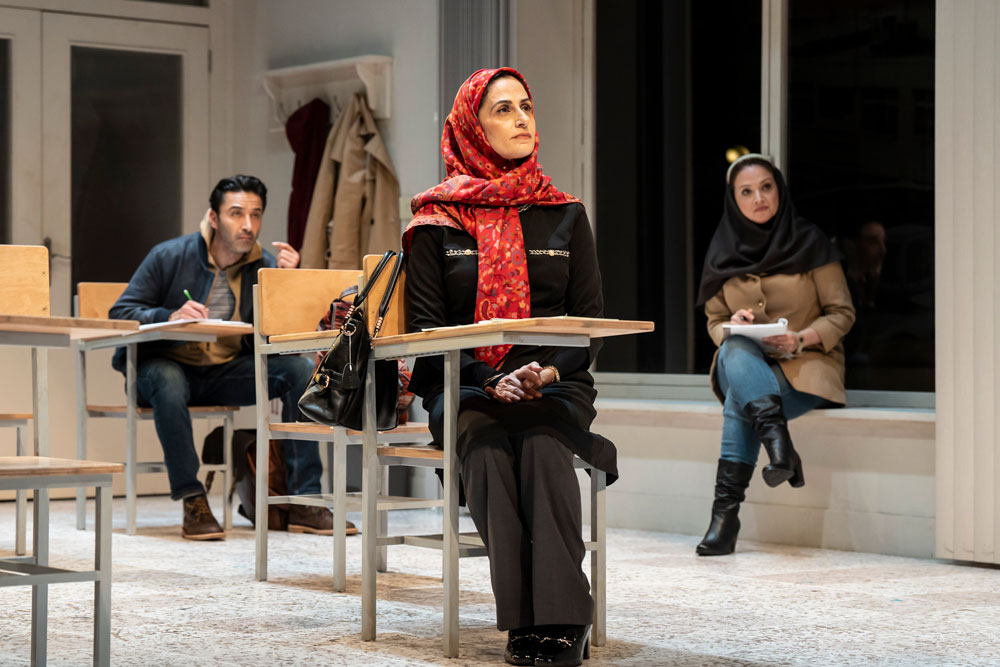
Another student, Omid (Pej Vahdat), wants to unlock the potential brought by a green card. But it’s Elham (Nikki Massoud) who’s most explicit about the fact that this effort is purely one of necessity. And not one that she relishes. She even exhibits a certain resentment for having to use another language in order to accomplice her goals in medicine. Goals she might not be able to achieve in Iran. Unlike the class’s teacher, Marjan (Roxanna Hope Radja), she’s no Anglophile who finds beauty and a sense of completeness and fulfillment in the English language. She’s also unlike, Goli (Shadee Vossoughi), the teenager who’s always felt a pull to the English language and the freedom of expression it allows. “English does not want to be poetry like Farsi,” she says to help explain her attraction.
A wonderful teacher, Marjan’s combination of patient and intelligent nurturing allows us to see her and her students with astonishing clarity as she encourages and reassures them that they can conquer this mountain. As bright, driven and resolute as Elham is, she confesses privately to her teacher that she’s taken the TOEFL multiple times and failed. Quite a confession for someone who’s taken the MCAT. It’s the first hint that truly learning a language, absorbing it’s nuances and subtleties, is much more than a rote exercise. English shows us that it’s more akin to a baptism that leaves you changed. An undertaking that endows you with a second self.
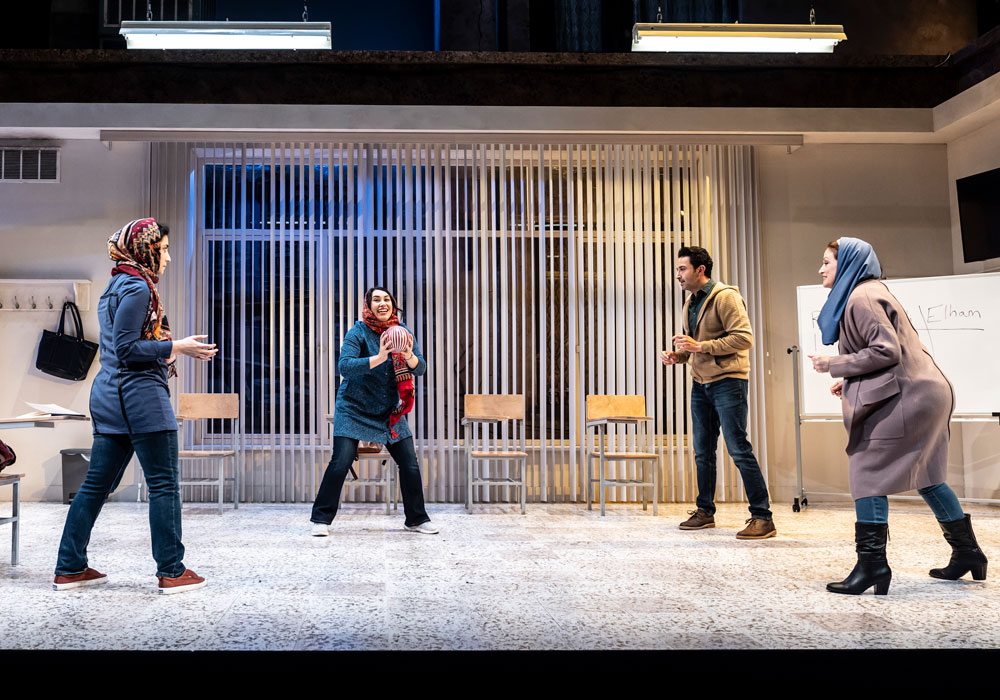
Showing that process of growth in all four of the students in this classroom would make English more than fulfilling. But what it does most eloquently and most beautifully is expose the costs of becoming a chameleon. Altering yourself to fit into another environment that allows you not only to survive, but thrive. The three who plan to leave dread the accent that will mark them as “other” in their land of opportunity. It explains why everyone’s so jealous of Omid, who although in an advanced class, speaks enviably precise English. They also notice how he and Marjan have developed a special relationship. Both Omid’s English skills and the bond he and his teacher share become salient plot points that add precious depth to a story that so brilliantly makes the ordinary riveting.
Monolinguists may have a difficult time understanding how proficiency in a second language can alter the way we view ourselves. How in one language you may find yourself kinder and in another you may perceive yourself to be less competitive or impatient. It’s a phenomenon that points to how dramatically language impacts our self-image. And one that should give us pause when interacting with the many millions of people who have the courage to leave their homeland in pursuit of something better in a foreign land.
Drawn to provide a spectrum of reasons why people make the choice to migrate, English also shows why others may choose the opposite. Rather than relinquish or be placed in a position that requires their cultural identity be suppressed, they alter the decision to leave to preserve what they see as their wholeness. With this cast and Dehghani’s sure and compassionate direction, English reveals the intricate complexities of both positions.
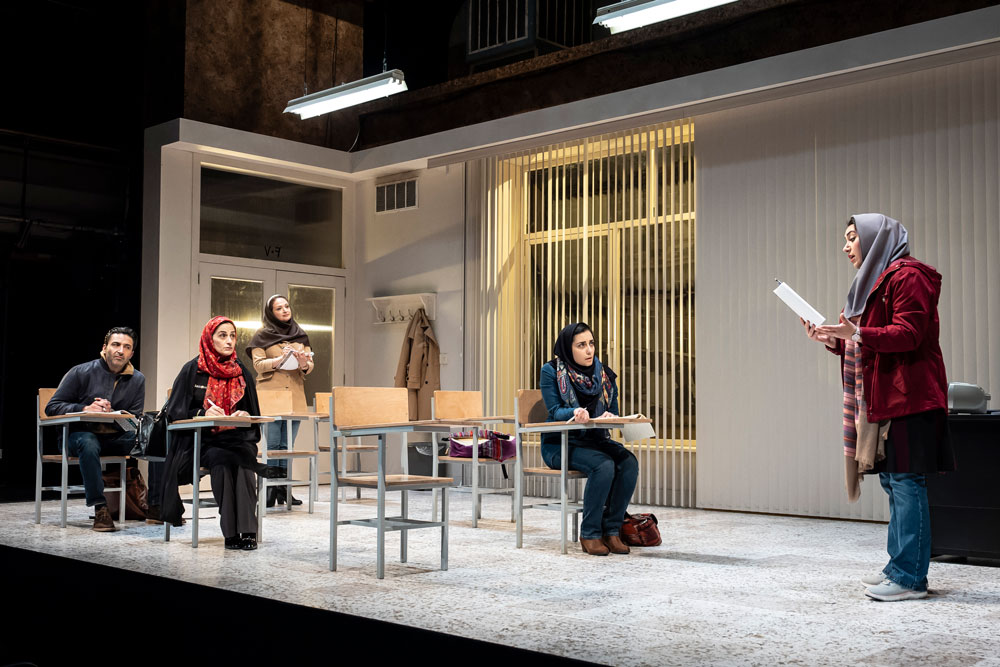
With her fire, dexterity of mind and brazen bluntness, Massoud as Elham will likely be the favorite of many. Excellent in the role, Massoud’s spirit of determination and spontaneous mischief energizes the production tremendously. But Radja in her role of Marjan is equally compelling in the way she copes with the lingering regret about the choice she ultimately made. And although Roya is not a dominant character, the way Bibiyan embodies her pride is like watching someone attain the majestic as she comes to a fateful realization and decision.
Set in a classroom in Karaj, Iran, Courtney O’Neill’s stage design uses windows to, with well calculated subtlety; bring the texture, color and visual feel of a large metropolitan Middle Eastern city to life and provide valuable understanding of place. Channeling her rage to foster understanding, Toossi has created a work that replaces outrage with balance. Something that, as it filters through society, will nurture empathy through transformative storytelling.
English
Through June 16th, 2024
Goodman’s Owen Theatre
170 North Dearborn Street
Chicago, IL 60601